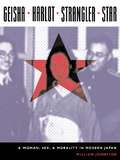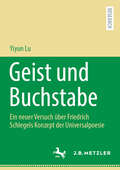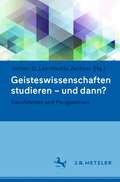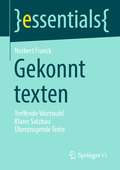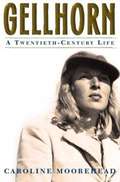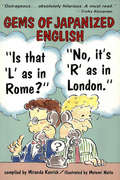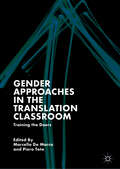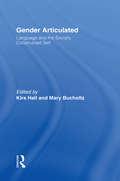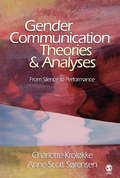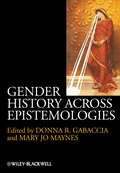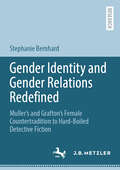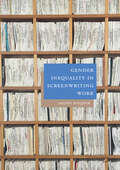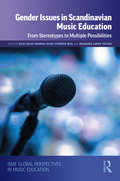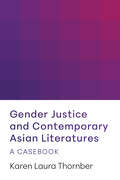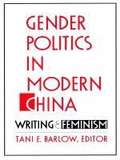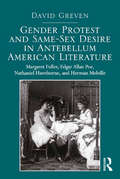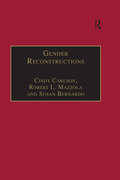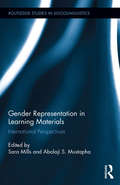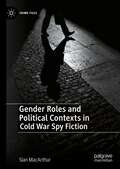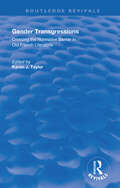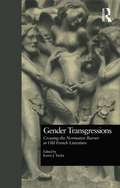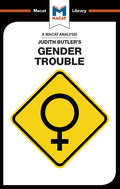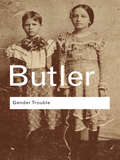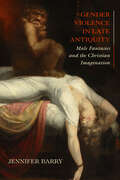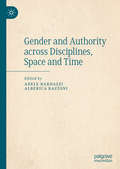- Table View
- List View
Geisha, Harlot, Strangler, Star: A Woman, Sex, and Morality in Modern Japan (Asia Perspectives: History, Society, and Culture)
by William JohnstonIn May 1936, Abe Sada committed the most notorious crime in twentieth-century Japan—the murder and emasculation of her lover. What made her do it? And why was she found guilty of murder yet sentenced to only six years in prison? Why have this woman and her crime remained so famous for so long, and what does her fame have to say about attitudes toward sex and sexuality in modern Japan?Despite Abe Sada's notoriety and the depictions of her in film and fiction (notably in the classic In the Realm of the Senses), until now, there have been no books written in English that examine her life and the forces that pushed her to commit the crime. Along with a detailed account of Sada's personal history, the events leading up to the murder, and its aftermath, this book contains transcripts of the police interrogations after her arrest—one of the few existing first-person records of a woman who worked in the Japanese sex industry during the 1920s and 1930s—as well as a memoir by the judge and police records. Geisha, Harlot, Strangler, Star steps beyond the simplistic view of Abe Sada as a sexual deviate or hysterical woman to reveal a survivor of rape, a career as a geisha and a prostitute, and a prison sentence for murder. Sada endured discrimination and hounding by paparazzi until her disappearance in 1970. Her story illustrates a historical collision of social and sexual values—those of the samurai class and imported from Victorian Europe against those of urban and rural Japanese peasants.
Geist und Buchstabe: Ein neuer Versuch über Friedrich Schlegels Konzept der Universalpoesie
by Yiyun LuDas vorliegende Buch ist ein neuer, komparatistisch angelegter Versuch über Friedrich Schlegels Konzept der ‚Universalpoesie‘. Dieser Kernbegriff der Früh-Romantik wird mittels der von Schlegel der Bibel entliehenen Paulinischen Dichotomie von ‚Geist‘ und ‚Buchstaben‘ erörtert. Mit seiner romantischen Poetik polemisiert Schlegel vor allem gegen das, was er die europäische ‚Geisteskrankheit‘ nennt. Gemeint ist die ‚Buchstabenkunst‘, die entweder durch leeres Formspiel, wie dies bei der französischen Neoklassik der Fall ist, oder, wie bei den Engländern, durch die Verfolgung rein materieller Zwecke gekennzeichnet sei. In beiden Fällen fehle es, so Schlegel, an dem echt ‚Geistigen‘, d. h. an etwas ‚Apriorischem‘, das der reinen Empirie gegenüberstehen soll. Die vorliegende Arbeit integriert in ihrem Herangehen eine historische und eine hermeneutische Position. Der Akzent liegt auf dem zunächst zu erledigenden ‚rekonstruktiven‘ Schritt. Sodann werden Möglichkeiten diskutiert, Schlegels Position als Schritte hin zu einem existenzialphilosophischen Verständnis von Sprache und Kunst zu lesen, so, wie es dann bei Nietzsche, Heidegger und Gadamer entfaltet wird.
Geisteswissenschaften studieren - und dann?: Berufsfelder und Perspektiven
by Jochen O. Ley Hedda ZechnerDieser Band informiert über Berufsperspektiven für künftige und ausgebildete Geisteswissenschaftler*innen. Der erste Teil gibt einen Überblick über die Fähigkeiten und Kompetenzen, die im Studium erworben werden, und untersucht die Zukunft der Arbeit sowie die Chancen für Geisteswissenschaftler*innen im 21. Jahrhundert. Im zweiten Teil erzählen 21 Geisteswissenschaftler*innen in Interviews über ihr Studium, ihren Weg in die Berufstätigkeit, über Herausforderungen und Chancen und geben Tipps für die berufliche Zukunft.
Gekonnt texten: Treffende Wortwahl Klarer Satzbau Überzeugende Texte (essentials)
by Norbert FranckSchreiben heißt sich zeigen. Dieses essential zeigt, wie man sich schreibend von seiner besten Seite zeigt. Dieses essential vermittelt kompakt und anschaulich das Know-how und Handwerkszeug fürs Schreiben lesefreundlicher Texte, die Kunden überzeugen, Kolleginnen erfreuen, Vorgesetzte beeindrucken und Spenderinnen binden. Dieses essential ist keine Stilkunde mit erhobenem Zeigefinger, sondern erläutert praxisorientiert, wie man Schreibhürden überwindet und sich das Schreibleben erleichtert – wie man Freude am Schreiben entwickelt.
Gellhorn: A Twentieth-Century Life
by Caroline MooreheadMartha Gellhorn's heroic career as a reporter brought her to the front lines of virtually every significant international conflict between the Spanish Civil War and the end of the Cold War.
Gems of Japanized English
by Miranda KenrickJapanese do things better, this book may be the ideal antidote. Even the Japanese are quick to admit that despite their enthusiasm for learning it, they still have a certain amount of difficulty with the English language.This is no new phenomenon. Shortly after Japan opened her ports to foreign traders, one doctor advertised himself as "a Specialist in the Decease of Children"; eggs were sold as "extract of fowl" ; and a notice advised that "Tomorrow, from midnight to 12 noon, you will receive dirty water. " Fortunately, things are improving, but very slowly. A more recent English-language newspaper reported that someone's "wedding was consummated in the garden of the American consul's home," while a road sign was posted near a busy intersection that commanded drivers to "Have many accidents here."Long-time Tokyo resident Miranda Kenrick has collected these and hundreds of other delightful anecdotes to form a lighthearted, but unabashedly affectionate, portrait of the J apanese at home. R eading this book may do more for U.S.-Japan relations than a whole bookshelf of more seriousminded tomes.
Gender Approaches in the Translation Classroom: Training the Doers
by Marcella De Marco Piero TotoThis volume examines strategies for embedding gender awareness within translation studies and translator training programmes. Drawing on a rich collection of theoretically-informed case studies, its authors provide practical advice and examples on implementing gender-inclusive approaches and language strategies in the classroom. It focuses on topics including, how to develop gender-inclusive practices to challenge students’ attitudes and behaviours; whether there are institutional constraints that prevent trainers from implementing non-heteronormative practices in their teaching; and how gender awareness can become an everyday mode of expression. Positioned at the lively interface of gender and translation studies, this work will be of interest to practitioners and scholars from across the fields of linguistics, education, sociology and cultural studies.
Gender Articulated: Language and the Socially Constructed Self
by Mary Bucholtz Kira HallGender Articulated is a groundbreaking work of sociolinguistics that forges new connections between language-related fields and feminist theory. Refuting apolitical, essentialist perspectives on language and gender, the essays presented here examine a range of cultures, languages and settings. They explicitly connect feminist theory to language research. Some of the most distinguished scholars working in the field of language and gender today discuss such topics as Japanese women's appropriation of "men's language," the literary representation of lesbian discourse, the silencing of women on the Internet, cultural mediation and Spanish use at New Mexican weddings and the uses of silence in the Anita Hill-Clarence Thomas hearings.
Gender Communication Theories and Analyses: From Silence to Performance
by Dr Charlotte Kroløkke Anne Scott SorensenGender Communication Theories and Analyses: From Silence to Performance surveys the field of gender and communication with a particular focus on feminist communication theories and methods - from structuralism to poststructuralism. In this text, authors Charlotte Krolokke and Ann Scott Sorensen help readers develop analytic focus and knowledge about their underlying assumptions that gender communication scholars use in their work.
Gender History Across Epistemologies (Gender and History Special Issues)
by Donna R. Gabaccia Mary Jo MaynesGender History Across Epistemologies offers broad range of innovative approaches to gender history. The essays reveal how historians of gender are crossing boundaries - disciplinary, methodological, and national - to explore new opportunities for viewing gender as a category of historical analysis. Essays present epistemological and theoretical debates central in gender history over the past two decades Contributions within this volume to the work on gender history are approached from a wide range of disciplinary locations and approaches The volume demonstrates that recent approaches to gender history suggest surprising crossovers and even the discovery of common grounds
Gender Identity and Gender Relations Redefined: Muller’s and Grafton’s Female Countertradition to Hard-Boiled Detective Fiction
by Stephanie BernhardThe present study compares the depiction of female as well as male characters and their identities in American detective fiction at different times. In detail, it analyzes to what extent American hard-boiled detective fiction by and about professional women from the 1980s onwards reinvents the formula and the gender perceptions of their male forerunners in the 1920s and 1930s. It examines how the female authors alter the norms and ideologies of the male original and adjust the depiction of female as well as male characteristics and roles toward a less stereotyped, but more authentic presentation.
Gender Inequality in Screenwriting Work
by Natalie WreyfordThis is the first book to critically examine the recruitment and working practices of screenwriters. Drawing on interviews with screenwriters and those that employ them, Natalie Wreyford provides a deep and detailed understanding of entrenched gender inequality in the UK film industry and answers the question: what is preventing women from working as screenwriters? She considers how socialised recruitment and gendered taste result in exclusion, and uncovers subtle forms of sexism that cause women’s stories and voices to be discounted. Gender Inequality in Screenwriting Work also reveals the hidden labour market of the UK film industry, built on personal connections, homophily and the myth of meritocracy. It is essential reading for students and scholars of gender, creative industries, film and cultural studies, as well as anyone who wants to understand why women remain excluded from many key roles in filmmaking.
Gender Issues in Scandinavian Music Education: From Stereotypes to Multiple Possibilities (ISME Series in Music Education)
by Silje Valde OnsrudGender Issues in Scandinavian Music Education: From Stereotypes to Multiple Possibilities introduces much-needed updates to research and teaching philosophies that envision new ways of considering gender diversity in music education. This volume of essays by Scandinavian contributors looks beyond the dominant Anglo-American lens while confronting a universal need to resist and rethink the gender stereotypes that limit a young person’s musical development. Addressing issues at all levels of music education—from primary and secondary schools to conservatories and universities— topics discussed include: the intersection of social class, sexual orientation, and teachers’ beliefs; gender performance in the music classroom and its effects on genre and instrument choice; hierarchical inequalities reinforced by power and prestige structures; strategies to fulfill curricular aims for equality and justice that meet the diversity of the classroom; and much more! Representing a commitment to developing new practices in music education that subvert gender norms and challenge heteronormativity, Gender Issues in Scandinavian Music Education fills a growing need to broaden the scope of how gender and equality are situated in music education—in Scandinavia and beyond.
Gender Justice and Contemporary Asian Literatures: A Casebook
by Karen Laura ThornberThis casebook investigates how diverse writers from across East, South, and Southeast Asia and their diasporas have engaged with the struggle for gender justice. Each chapter analyzes works of literature originally written in Bengali, Chinese, English, Indonesian, Japanese, Khmer, Korean, Marathi, Thai, and Vietnamese.Aimed at both specialists and nonspecialists, Gender Justice and Contemporary Asian Literatures addresses such subjects as gender imparity in male-dominated professions; the lives of migrant sex workers and caregivers; the fight against reproductive, family, non-partner, and intimate partner violence; and norms of shame and silence surrounding violence against women. Informed by the author's deep knowledge of literature, history, culture, law, and social conditions, this book will be a resource for instructors and students in gender studies, women's studies, ethnic studies, Asian studies, Asian American studies, Asian diaspora studies, comparative literature, and world literature.
Gender Politics in Modern China: Writing and Feminism
by Tani E. BarlowThrough the lens of modern Chinese literature, Gender Politics in Modern China explores the relationship between gender and modernity, notions of the feminine and masculine, and shifting arguments for gender equality in China.Ranging from interviews with contemporary writers, to historical accounts of gendered writing in Taiwan and semi-colonial China, to close feminist readings of individual authors, these essays confront the degree to which textual stategies construct notions of gender. Among the specific themes discussed are: how femininity is produced in texts by allocating women to domestic space; the extent to which textual production lies at the base of a changing, historically specific code of the feminine; the extent to which women in modern Chinese societies are products of literary canons; the ways in which the historical processes of gendering have operated in Chinese modernity vis à vis modernity in the West; the representation of feminists as avengers and as westernized women; and the meager recognition of feminism as a serious intellectual current and a large body of theory.Originally published as a special issue of Modern Chinese Literature (Spring & Fall 1988), this expanded book represents some of the most compelling new work in post-Mao feminist scholarship and will appeal to all those concerned with understanding a revitalized feminism in the Chinese context.Contributors. Carolyn Brown, Ching-kiu Stephen Chan, Sung-sheng Yvonne Chang, Yu-shih Chen, Rey Chow, Randy Kaplan, Richard King, Wolfgang Kubin, Wendy Larson, Lydia Liu, Seung-Yeun Daisy Ng, Jon Solomon, Meng Yue, Wang Zheng
Gender Protest and Same-Sex Desire in Antebellum American Literature: Margaret Fuller, Edgar Allan Poe, Nathaniel Hawthorne, and Herman Melville
by David GrevenExpanding our understanding of the possibilities and challenges inherent in the expression of same-sex desire before the Civil War, David Greven identifies a pattern of what he calls ’gender protest’ and sexual possibility recurring in antebellum works. He suggests that major authors such as Margaret Fuller, Edgar Allan Poe, Herman Melville, and Nathaniel Hawthorne consciously sought to represent same-sex desire in their writings. Focusing especially on conceptions of the melancholia of gender identification and shame, Greven argues that same-sex desire was inextricably enmeshed in scenes of gender-role strain, as exemplified in the extent to which The Narrative of Arthur Gordon Pym depicts masculine identity adrift and in disarray. Greven finds similarly compelling representations of gender protest in Fuller’s exploration of the crisis of gendered identity in Summer on the Lakes, in Melville’s representation of Redburn’s experience of gender nonconformity, and in Hawthorne’s complicated delineation of desire in The Scarlet Letter. As Greven shows, antebellum authors not only took up the taboo subjects of same-sex desire and female sexuality, but were adept in their use of a variety of rhetorical means for expressing the inexpressible.
Gender Reconstructions: Pornography and Perversions in Literature and Culture
by Cindy Carlson Robert L. MazzolaTimely and politically pertinent, this collection of essays links the fields of women’s studies and cultural studies, examining women’s desires and women as objects of desire. Working in diverse disciplines and time periods, the contributors address the common theme of 'perversion' as a cultural, often linguistic, construct. Analysing texts and images from medieval times to the twentieth century, the volume affords the reader modernist and postmodernist perspectives on the connected issues of erotics, pornography, and perversion.
Gender Representation in Learning Materials: International Perspectives (Routledge Studies in Sociolinguistics)
by Sara Mills Abolaji S. MustaphaRepresentations of gender in learning materials convey an implicit message to students about attitudes towards culturally appropriate gender roles for women and men. This collection takes a linguistic approach to exploring theories about gender representation within the sphere of education and textbooks, and their effects on readers and students within an international context. In the opening section, contributors discuss theories of representation and effect, challenging the conventional Althusserian model of interpellation, and acknowledging the challenges of applying Western feminist models within an international context. Following chapters provide detailed analyses focusing on a number of different countries: Australia, Japan, Brazil, Finland, Russia, Hong Kong, Nigeria, Germany, Qatar, Tanzania, and Poland. Through linguistic analysis of vocabulary associated with women and men, content analysis of what women and men say in textbooks, and discourse analysis of the types of linguistic moves associated with women and men, contributors evaluate the extent to which gendered representations in textbooks perpetuate stereotypical gender roles, what the impact may be on learners, and the ways that both teachers and learners interact and engage with these texts.
Gender Roles and Political Contexts in Cold War Spy Fiction (Crime Files)
by Sian MacArthurThis book analyses the gender roles and political contexts of spy fiction narratives published during the years of the Cold War. It offers an introduction to the development of spy fiction both in England and in the United States and explores the ways in which issues such as the atomic bomb, double agents, paranoia, propaganda and megalomania manifest themselves within the genre. The book examines the ongoing marginalization of women within spy fiction texts, exploring the idea that this unique period in global history is responsible for the active promotion and celebration of masculinity and male superiority. From James Bond to Jason Bourne, the book evaluates the ongoing enforcement of patriarchal ideas and oppressions that, in the name of national security and patriotic duty, have contributed to the development of a genre in which discrimination and bias continue to dominate.
Gender Transgressions: Crossing the Normative Barrier in Old French Literature (Garland Library Of Medieval Literature Ser. #Vol. 2064)
by Karen J. TaylorFirst published in 1998 this collection, comprising nine critical essays from prominent and emerging medievalists, seeks to explore the different ways in which French authors of the Middle Ages transgress normative social and cultural codes in their literary works.
Gender Transgressions: Crossing the Normative Barrier in Old French Literature (Garland Library of Medieval Literature #Vol. 2064)
by Karen J. TaylorFirst published in 1998. Routledge is an imprint of Taylor & Francis, an informa company.
Gender Trouble
by Tim Smith-LaingJudith Butler's Gender Trouble is a perfect example of creative thinking. The book redefines feminism's struggle against patriarchy as part of a much broader issue: the damaging effects of all our assumptions about gender and identity. Looking at the factionalism of contemporary (1980s) feminism, Butler saw a movement split by identity politics. Riven by arguments over what it meant to be a women, over sexuality, and over class and race, feminism was falling prey to internal problems of identity, and was failing to move towards broader solidarity with other liberation movements such as LGBT. Butler turned these issues on their head by questioning the basis that supposedly fundamental and fixed identities such as 'masculine/feminine' or 'straight/gay' actually have. Tracing these binary definitions back to the binary nature of human anatomy ('male/female'), she argues that there is no necessary link between our anatomies and our identities. Subjecting a wide range of evidence from philosophy, cultural theory, anthropology, psychology and anthropology to a renewed search for meaning, Butler shows both that sex (biology) and gender (identity) are separate, and that even biological sex is not simplistically either/or male/female. Separating our biology from identity then allows her to argue that, while categories such as 'masculine/feminine/straight/gay' are real, they are not necessary; rather, they are the product of society's assumptions, and the constant reproduction of those assumptions by everyone around us. That opens up some small hope for change: a hope that – 25 years after Gender Trouble's publication – is having a huge impact on societies and politics across the world.
Gender Trouble: Feminism and the Subversion of Identity (Routledge Classics)
by Judith ButlerOne of the most talked-about scholarly works of the past fifty years, Judith Butler’s Gender Trouble is as celebrated as it is controversial. Arguing that traditional feminism is wrong to look to a natural, 'essential' notion of the female, or indeed of sex or gender, Butler starts by questioning the category 'woman' and continues in this vein with examinations of 'the masculine' and 'the feminine'. Best known however, but also most often misinterpreted, is Butler's concept of gender as a reiterated social performance rather than the expression of a prior reality. Thrilling and provocative, few other academic works have roused passions to the same extent.
Gender Violence in Late Antiquity: Male Fantasies and the Christian Imagination
by Jennifer BarryGender Violence in Late Antiquity confronts the violent ideological frameworks underpinning the early Christian imagination, arguing that gender-based violence is not peripheral but is fundamental to understanding early Christian history. By analyzing hagiographical and doctrinal writings, Jennifer Barry reveals how male authors used portrayals of feminized suffering to shape ideals of sanctity and power, exploiting themes of domestic abuse, martyrdom, and sexualized violence to reinforce their visions of piety. The study first traces the roots of gendered violence within the Greco-Roman and early Christian imagination, and then explores the disturbing role of male fantasies and dreams in hagiographical traditions. Barry draws on womanist scholarship and engages with trauma studies and feminist horror theory in order to challenge traditional readings of Christian texts, offering new perspectives for understanding how narratives of violence continue to shape contemporary interpretations of gender and power.
Gender and Authority across Disciplines, Space and Time
by Adele Bardazzi Alberica BazzoniThis edited collection investigates the relationship between gender and authority across geographical contexts, periods and fields. Who is recognized as a legitimate voice in debate and decision-making, and how is that legitimization produced? Through a variety of methodological approaches, the chapters address some of the most pressing and controversial themes under scrutiny in current feminist scholarship and activism, such as pornography, political representation, LGBTI struggles, female genital mutilation, the #MeToo movement, abortion, divorce and consent. Organized into three sections, “Politics,” “Law and Religion,” and “Imaginaries,” the contributors highlight formal and informal aspects of authority, its gendered and racialized configurations, and practices of solidarity, resistance and subversion by traditionally disempowered subjects. In dialogue with feminist scholarship on power and agency, the notion of authority as elaborated here offers a distinctive lens to critique political and epistemic foundations of inequality and oppression, and will be of use to scholars and students across gender studies, sociology, politics, linguistics, theology, history, law, film, and literature.
